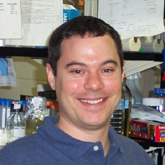Congratulations to Dr. Brian Strahl, Associate Professor of Biochemistry and Biophysics, for receiving a new EUREKA award from the NIH “for exceptionally innovative research projects that could have an extraordinarily significant impact on many areas of science.”

Dr. Strahl is one of 38 investigators recently awarded the EUREKA grant from the National Institutes of Health (NIH). A total of $42.2 million in grants were awarded in this new program.
EUREKA (an acronym for Exceptional, Unconventional Research Enabling Knowledge Acceleration) is a program that targets scientists who are experimenting on novel hypotheses. The potential impact of the proposed research must be substantial in terms of both the size of the scientific community affected and the magnitude of its impact on the community. According to NIH Director, Dr. Elias A. Zerhouni “The program reflects NIH’s commitment to supporting potentially transformative research, even if it carries a greater than usual degree of scientific risk.”
Almost 8 years ago, Drs. David Allis and Brian Strahl formally proposed the ‘histone code’ hypothesis to explain how distinct histone modifications could regulate epigenetic inheritance, gene expression and the control of cell growth. However, limited experimental support exists for this hypothesis, and to date, it is unclear whether the binding of DNA-associated proteins to combinatorially modified histones is a universal phenomenon of these regulators or is restricted to a subset of histone-binding proteins. With funds from his EUREKA award, Dr. Strahl’s group proposes to develop new approaches and technologies to crack the underlying basis of the ‘histone code’.
Dr. Strahl’s previous accomplishments include being chosen as a Pew Scholar, receiving the UNC Jefferson Pilot Award, Presidential Early Career Award, and the ASBMB Schering-Plough Award.
For a complete list of all EUREKA grant awardees: http://www.nigms.nih.gov/Research/Mechanisms/EUREKAGrants.htm
Related UNC news release: UNC scientist receives new NIH grant for ‘exceptional’ research